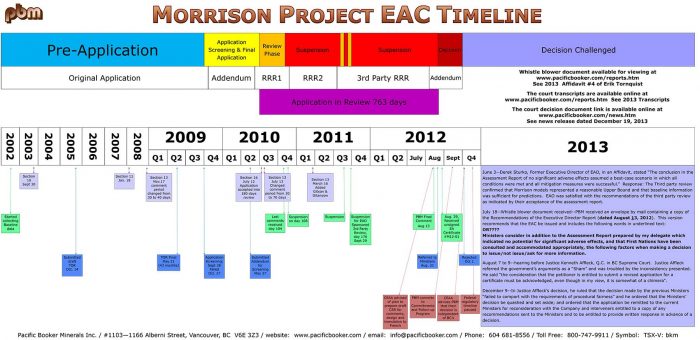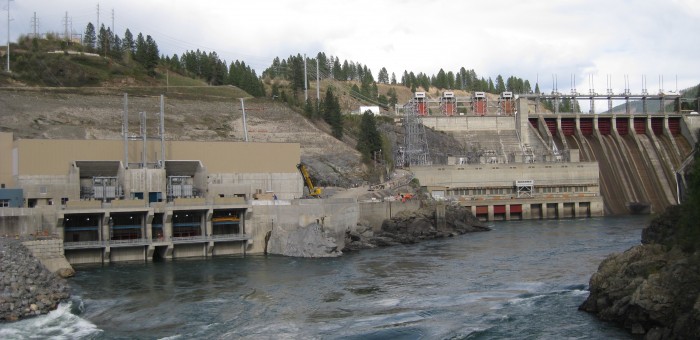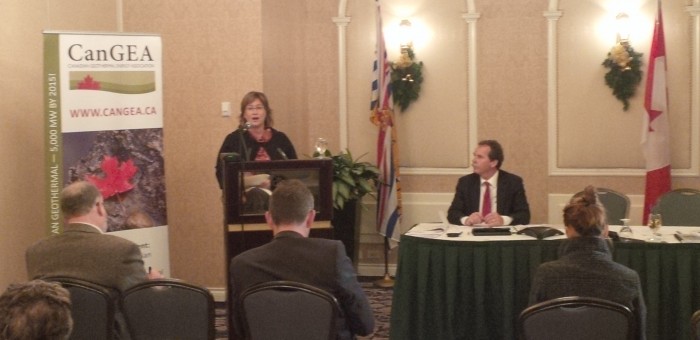Jobs
Support for small business as the COVID-19 pandemic plays out
Over the last two weeks governments across Canada have introduced some of the most far reaching and ambitious programs in recent memory to deal with the economic fallout of COVID-19. The policymakers and civil servants behind these supports deserve to be commended for the speed at which they have acted and for their ingenuity. Despite these unprecedented government interventions into the economy it is becoming increasingly clear that the measures introduced so far are not enough. Many businesses are slipping through the cracks of the available supports and are struggling to make ends meet.
Statistics released by the BC Chamber of Commerce (BCC) and the Canadian Federation of Independent Business (CFIB) on the scale of the economic devastation brought about by COVID-19 are staggering. Two-thirds of the 1,900 businesses polled by the BCC have experienced at least a 50% decrease in revenue and over half are worried that they will face bankruptcy or be unable to resume operations when the crisis subsides. Almost 40 percent of independent businesses surveyed by the CFIB have said that the Canada Emergency Wage Subsidy will not help them and 56% said that they have no fiscal capacity to take on new debt. These statistics released by business advocacy groups are consistent with the daily emails my office has received informing us that the existing measures are not enough. Messages received by my constituency office, ongoing conversations with small businesses and reports from the media highlight gaps in the existing programs. Some of the gaps are outlined below.
Eligibility for the Canada Emergency Business Account
The Canada Emergency Business Account is open to businesses with a total payroll between $50,000.00 and $1,000,000.00 in 2019. However, there are many small businesses with 10 to 20 employees whose payroll exceeds the program’s upper limit. For instance, small health, technology and manufacturing companies whose growth the province has been trying to cultivate will be particularly hard hit by the program’s restrictions.
BC Hydro Small Business Credit
The BC Hydro Small Business Tax Credit defines “small business” as those that qualify for their Small General Service Rate. The effect of this restriction is that numerous businesses with narrow profit margins that use high amounts of electricity (i.e. local restaurants using the medium general service rate) will not be eligible for the benefit. Although BC Hydro does allow payments to be deferred, many of these bills will be due at precisely the same time when businesses will be trying to recover from the crisis.
Restrictions in the Wage Subsidy
The original structure of the Canada Emergency Wage Subsidy worked against small businesses who had experienced substantial declines in revenue but were still trying to stay open to provide services to people. Eligibility requirements originally restricted applications to businesses that have experienced at least a 30% drop in revenue when comparing one month this year to same month last year. This restriction would have meant that businesses whose revenue had decreased by 20% or even 29% would not qualify for the subsidy. The direct effects of restricting the availability of the program would have been further layoffs of workers which defeats the announced goal of the support. As it stands, within the foodservice industry 7 out of 10 businesses will continue to reduce staff hours or lay off more employees if their current situation does not improve. Recently announced changes to the bill will allow businesses to qualify for the subsidy if they can demonstrate a 15 percent drop in revenue in March. Companies will also be permitted use January or February as their base line in certain situations. These changes to the legislation show that the government is listening to business owners. However, continued monitoring is needed to determine if they adequately address the bill’s original flaws.
Profit margins and the use of a ‘one-size fits all’ approach
For many small businesses with narrow profit margins, the difference between remaining viable and facing insolvency is extremely thin, making a substantial decline in revenue potentially devastating. Given the financial position of many small businesses, the measures introduced so far may not be enough to keep them afloat. While the wage subsidy does offer some support, many businesses still have substantial fixed costs (i.e. rent, utilities). These businesses are seeing reduced revenue due to disruption in their supply chains and decreased demand in the economy. Furthermore, numerous already overextended business owners feel that they don’t have the fiscal capacity to take out additional loans. The structure of the existing programs also does little to support small businesses reliant on cyclical or seasonally dependent revenue who have recently seen their sales dry up. For businesses in this position tax deferrals or loans will become difficult to finance with their primary revenue source having evaporated.
Looking Ahead
Going forward, both the provincial and federal government will need to work together to quickly address the gaps in support measures introduced so far. Solutions which have been floated by business groups include: direct payments to business (especially those hardest-hit by the crisis), further reductions in taxes, and supports for businesses unable to pay rent. Other countries may provide models for how to respond as well. Both Norway and Demark have introduced schemes to help companies experiencing revenue losses to pay their fixed costs. Switzerland has launched a program where the small business can apply for interest free loans of up to 10 percent of their annual revenue (SFr500,000 maximum) which are fully backed by the government.
Right now, the current collapse in economic activity is happening at an unprecedented pace. Nearly one quarter of the businesses surveyed by the CFIB stated that they will be unable to make it through the next month without additional support. Within the foodservice industry almost 10 percent of restaurants have already closed and an additional 18 per cent could permanently close by the end of April if current conditions persist. Time is of the essence in getting businesses the support they need.
By expanding the available support programs for small businesses, governments will be reducing the amount of economic hardship experienced by countless numbers of people. Supporting hard-hit businesses will be an incredibly expensive in the short-term. There are major long-term benefits to ensuring that businesses are able to remain operational. Keeping more small businesses solvent throughout the pandemic will help to prevent businesses and workers from needing to re-establish their niches in the economy after the crisis abates. By acting now to support small businesses, governments will be saving central pillars within our communities. These businesses help to make our communities feel like home by providing us with a sense of place and identity. Given the importance of small businesses to our economy and communities, governments must take steps to ensure these businesses are able to emerge successfully from this crisis.
Exploring regulatory inconsistencies facing Pacific Booker’s Morrison mine project
Today during question period I rose to ask the Minister of Energy, Mines and Petroleum Resources about what appears to be regulatory inconsistencies facing the advancement of Pacific Booker’s Morrison Mine project. As you will see from the exchange below, I was not particularly impressed with the Minister’s response to my questions.
I intend to explore this issue further in the coming weeks.
Below I reproduce the video and text of the Question Period Exchange.
Video of Exchange
Question
A. Weaver: I’m sure every member of this House will agree that a stable regulatory environment is key to maintaining B.C.’s reputation as a welcoming place to do business. This means that the approval of natural resource projects must be based on scientific evidence and not politics. Yet in 2012, upon recommendation from the executive director of the environmental assessment office, the B.C. Liberals rejected the Morrison mine project proposed by Pacific Booker Minerals, despite it having received a positive environmental assessment. In justifying their decision, they cited environmental concerns about the effects of the mine on water quality in Morrison Lake and local salmon populations, despite already having a positive environmental assessment.
Despite their rejection of the Pacific Booker project, in 2013 the B.C. Liberals went to Ottawa to lobby the federal government to approve the Prosperity mine, a project that had received two negative assessments by federal review panels. There’s some suspicion that the decision around the Morrison mine had less to do with environmental concerns and more to do with political calculation.
My question is to the Minister of Energy, Mines and Petroleum Resources. Has this government been able to determine why this company was treated so differently from others at the time? And how will it prevent situations like this from happening in the future?
Answer
Hon. B. Ralston: I’d like to thank the member for Oak Bay–Gordon Head for his question. I’m sure the member will appreciate that I’m not in a position to advise what led the former government to make its decision about the proposed Morrison mine. What I can say, though, is that their approach was shortsighted and certainly didn’t bring certainty to the sector.
Our government has taken a different approach. My predecessor, as minister, initiated the Mining Jobs Task Force, which worked hard with First Nations, industry and communities to find ways to strengthen this fundamental, foundational industry.
There were 25 recommendations emanating from the task force. They’ve all been accepted by government, and almost all of them have now been implemented. We have made two mining tax credits permanent, bringing immediate benefits to the B.C. mineral exploration sector by adding more certainty. We’ve invested $1 million for the mining innovation roadmap, $1 million for the Regional Mining Alliance.
As further evidence of the strengthening of the sector, the Ontario Teachers Pension Plan just signed a $300 million investment deal to provide an investment in the New Afton mine, just outside the civic boundaries of Kamloops.
Supplementary Question
A. Weaver: I must admit that was a lot of information about a lot of mines that weren’t the mine I’m actually talking about. Maybe I can try again.
A key element of the previous government’s unrealistic strategy for natural resource development revolved around, as we all know, LNG. We know that certain natural gas projects were located in areas close to the Morrison mine. Comments from groups engaged in the Pacific Booker project have indicated that the province was facing significant pressure to avoid reopening discussions around the Morrison mine in order to obtain the support necessary for the Prince Rupert gas transmission line.
The decision to reject the project had serious repercussions for Pacific Booker. Their share price plummeted, from $14.95 to $4.95 in one day, and many investors lost their life savings. What’s more is that the ministry failed to inform Pacific Booker of its intention to issue an adverse recommendation and did not provide the company with an opportunity to respond to it.
After a legal battle in which the Supreme Court found that this conduct violated standards of procedural fairness and that the environmental assessment office recommendation be presented to cabinet for reconsideration, the government once again rejected the project in order to undergo further assessment. However, in its order, the government appeared to issue unclear directions that substantially delay the process. As of 2019, in September….
Interjections.
Mr. Speaker: Members.
A. Weaver: As of Sep 2019, Pacific Booker had yet to be fully provided with this opportunity. My question, again, is to the Minister of Energy, Mines and Petroleum Resources. When is this firm going to have the chance to have their project undergo further assessment, as put forward by the Supreme Court?
Answer
Hon. B. Ralston: The short answer is that the company is currently working through the required regulatory processes for further assessment. The further assessment for the proposed project includes the requirement for a supplemental application information requirement. There are a number of requirements. The EAO continues to work with the company on this, and I’m advised that the latest submission was received by the EAO in December 2019.
What’s the BC government doing to protect small-scale power producers in BC
Today in the legislature I rose to ask the Minister of Energy, Mines and Petroleum Resources what his government was doing to protect small scale power producers in British Columbia. Many of these power producers are already producing electricity yet they are unable to find a market for it since current regulation means that only BC Hydro is allowed to be the purchaser.
I use the specific example of Silversmith Power & Light Corporation to illustrate one of myriad problems facing the independent power producer sector.
Below I reproduce the video and text of my exchange with the Minister.
Video of Exchange
Question
A. Weaver: Under the NDP government in the 1990s, B.C. Hydro actively courted small-scale power producers to join their grid. One company, Silversmith hydro, received an offer to provide power to the New Denver area, in exchange for the opportunity to sell electricity to green markets. In formally accepting the offer, Silversmith bore the up-front costs associated with connecting to the B.C. Hydro grid.
Despite Silversmith’s sunk costs, B.C. Hydro later backed out of their agreement, compensating Silversmith at junk power rates, which were less than the cost of generation. After Silversmith raised the issue with the B.C. Liberal government, B.C. Hydro offered Silversmith a fair-market price for their electricity, but they only purchased a quarter of their capacity. During this same time period, B.C. Hydro continued to enter into opaque contracts with many large IPPs.
The situation with Silversmith is representative of how B.C. Hydro has dealt with numerous other small-scale power producers, even though many of these companies are considered to be the greenest hydro producers in the province.
My question through you, hon. Speaker, is to the Minister of Energy, Mines and Petroleum Resources: when is the government planning to rectify this situation and begin to deal more fairly with small-scale hydro producers in this province?
Answer
Hon. B. Ralston: Thanks to the member for the first question I’ve had in my new role as the Minister of Energy, Mines and Petroleum Resources.
Let me say that the B.C. Liberals chose to sign a series of sweetheart deals with their friends in the independent power sector, which cost every B.C. Hydro customer an extra $200 a year. In total, given the length of these contracts, people will pay, in British Columbia, a staggering $16 billion on unnecessary costs, all because the old government put their friends first.
They made a huge mess at B.C. Hydro and left people to pay for it. Some of the fallout is what is referred to in the member’s question. Under their watch, power rates went up by 70 percent. Given the chance, they wouldn’t have lowered hydro rates. Their plan would have seen people’s rates increase more than twice as much compared to our approach.
We’re focused on cleaning up the mess the old government left at B.C. Hydro and making it work for people. Making life affordable for people is a top priority for us as we work through phase 1 of B.C. Hydro review. As part of this work, B.C. Hydro is taking a prudent, case-by-case approach to deciding whether to renew expiring energy purchase agreements with independent power producers ensuring that prices are cost-effective for taxpayers.
I’m pleased to say that, as a result of this hard work, we’ll be able to apply for a rate reduction. This is the first time B.C. Hydro has been able to do this in decades. If our application is approved, before the independent regulator….
Interjections.
Hon. B. Ralston: You can’t take more good news?
If our application is approved, B.C. Hydro rate bills for consumers in British Columbia, for our citizens, will be 55 percent lower than what the old government wanted to charge.
We’ve also launched phase 2 of our review, to make sure it’s working for British Columbians.
Interjections.
Hon. B. Ralston: I’m not sure whether he’ll get a second question, so I want to make sure I give a full answer.
In our review, we’ll look at CleanBC’s electrification targets, new technologies, new rules for Indigenous nations, and looking for new opportunities at B.C. Hydro.
Supplementary Question
A. Weaver: Thank you to the minister for his answer. Unfortunately, to the minister’s answer, under his government the standing offer program under B.C. Hydro has been cancelled. As a direct consequence of that, a myriad small companies who have invested millions upon millions have now got lost capital. They are seeking indemnity, and they are seeking that money to be refunded through the court system. This has sent a very strong signal to the independent power producers, the small-scale producers in this province, that British Columbia is not a friendly place for small-scale hydro.
To the minister: what is he going to do to ensure that B.C. Hydro actually steps up and starts to rebuy those contracts and stops trying to squash each and every one of these small-scale producers, which exist in British Columbia already, with some capital?
Answer
Hon. B. Ralston: Let me repeat or recapitulate what I said last time. I think it bears repetition for sure. B.C. Hydro is taking a prudent, case-by-case approach to deciding whether to renew existing purchase power agreements with independent producers, ensuring prices that are cost-effective for taxpayers. And as part of the phase 2 review, the report is not yet in. I’m awaiting it.
We will be looking at making sure that we meet CleanBC’s electrification targets, new technologies, new roles for Indigenous nations, and looking at new opportunities for B.C. Hydro. That final report will be received very shortly.
So we will continue this important work while keeping rates affordable for British Columbia citizens.
Clean energy in British Columbia: The Opportunity
On Friday, November 8 I had the opportunity to deliver a keynote address over lunch to delegates of the Clean Energy BC, Generate 2019 Conference. As evident in the video and slides of my presentation (reproduced below), I started the talk with a framing of what is happening in the climate system, why we should care about it and what has been done in terms of greenhouse gas mitigation. I then moved on to a discussion of potential opportunities in electrification and innovation within the emerging field of negative emission technologies.
Presentation Video
Slides Used in presentation
1.  |
2.  |
3.  |
4.  |
5.  |
6.  |
7.  |
8.  |
9.  |
10.  |
11. 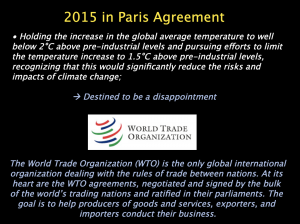 |
12.  |
13. 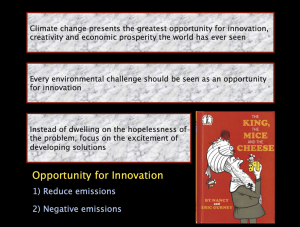 |
14.  |
15. 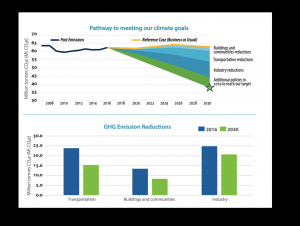 |
16. 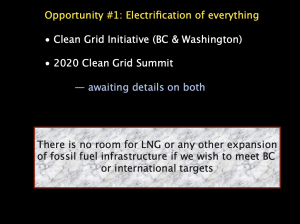 |
17. 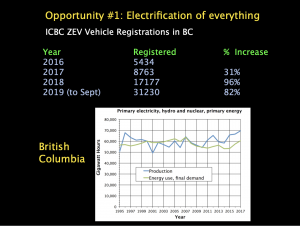 |
18.  |
19.  |
20. 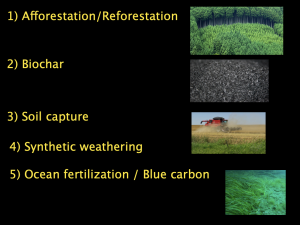 |
21.  |
22.  |
Why is British Columbia not exploiting its geothermal energy resources?
Today in the Legislature I asked the Minister of Energy, Mines and Petroleum Resources what her ministry is doing to encourage the use of our outstanding geothermal resources. Readers of this site will know that since as early as 2014, I have been trying to get both the BC Liberal Government and the present BC NDP government to recognize the incredible opportunity that geothermal energy innovation and production offers British Columbia.
Below I reproduce the video and text of our exchange.
Video of Exchange
Question
A. Weaver: Yesterday I asked the Minister of Jobs, Trade and Technology what his ministry was doing to encourage a strategic approach to transitioning away from the reliance on fossil fuels development in northern B.C. He talked about the importance of innovation. I agree. But there are barriers to innovation in B.C., and those barriers lie in B.C. Hydro.
Take the Borealis geothermal project in Valemount, for example. The member for Prince George–Valemount and I have been trying to get government to recognize the enormous potential for this project to showcase innovation in B.C.’s clean energy sector. British Columbia is the only jurisdiction in the Pacific Rim that isn’t using its geothermal resources. It strikes me as a no-brainer. Community support is strong. Valemount is at the end of an existing B.C. Hydro line, and with Glacier Destinations moving forward, enhanced local power production on an already stretched and often intermittent line will be required.
My question is this to the Minister of Energy, Mines and Petroleum Resources. Could she please explain what her ministry is doing to encourage the use of our outstanding geothermal resources?
Answer
Hon. M. Mungall: The opportunity for geothermal needs to be proven in B.C., and there are some companies that are doing just that. They’re working to prove up the geothermal resources that have been identified. Borealis is one of them. As the member will know — and the member for Prince George–Valemount — they received a permit just over a year ago to start doing that work. They actually have a new permit before the ministry. I look forward to seeing the recommendation from the ministry in terms of how to proceed with that permit so that they can do the work that they’ve been doing to prove up this opportunity with geothermal.
Supplementary Question
A. Weaver: The reality is that on the ground nothing is being done, not because of lack of industry or community support but rather because of cumbersome regulatory barriers and the absence of a champion within this government. Geothermal drilling is being regulated by the Oil and Gas Commission via rules that don’t reflect the practice within the international geothermal sector.
There is no ability for geothermal projects to lever existing federal funds without a strong provincial commitment. Our geothermal resources have the potential to diversify and decarbonize B.C.’s energy systems, provide energy with minimal environmental impact footprint — probably the smallest environmental footprint of any type of resource like that — create jobs and prosperity in northeastern B.C. and provide a showcase for innovation in our clean energy sector.
My question again is to the Minister of Energy, Mines and Petroleum Resources. When will her ministry start streamlining the regulatory process and start encouraging, as opposed to discouraging, British Columbia’s outstanding geothermal sector?
Answer
Hon. M. Mungall: My ministry has done nothing to discourage the opportunities with geothermal — in fact, quite the opposite.
Interjections.
Mr. Speaker: Members.
Hon. M. Mungall: I’m not too sure why the Liberals are all worked up about this particular issue, hon. Speaker. It’s not like they ever discovered geothermal when they were in office. The reality is that there’s quite a bit of science here that needs to be done, and it’s about a process in terms of actually making sure the resource is sufficient enough, hot enough, to actually generate electricity from it. That needs to be done. And that’s exactly what Borealis and other companies who are interested in doing this work in British Columbia are given the opportunity to do. I’m very glad that they’re here and making those investments, and I look forward to working with them going forward.


